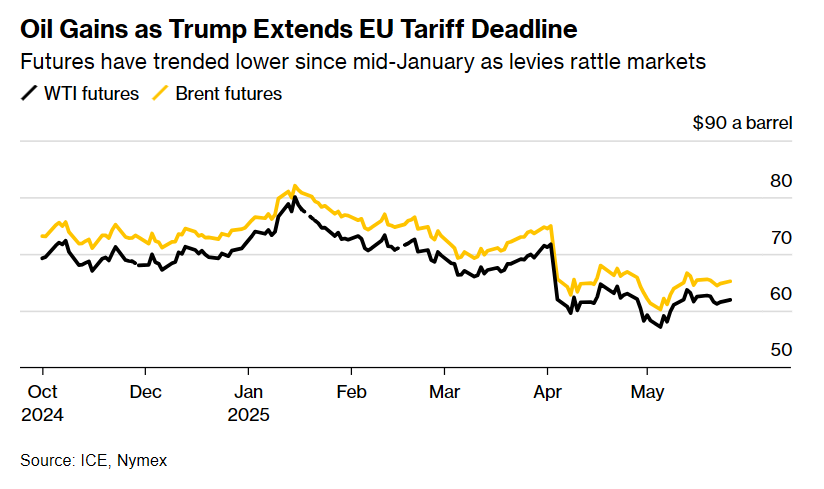Trump postpones tariffs against EU: Oil prices rise
 Photo: Oil has been trending downward since mid-January 2025 (Getty Images)
Photo: Oil has been trending downward since mid-January 2025 (Getty Images)
Oil prices are rising for the second consecutive session. This happened after US President Donald Trump said he would extend the pause against more serious retaliatory tariffs against the EU, Bloomberg reports.
The agency writes that the price of Brent crude has risen to around $65 per barrel, while West Texas Intermediate has dropped below $62.

Photo: chart of prices for non-Brent and West Texas Intermediate crude oil (screenshot from Bloomberg)
In particular, on Friday, Trump threatened to impose a higher duty against the EU of 50% as early as June. However, after talks with European Commission President Ursula von der Leyen, the US president gave the bloc until July 9 to conclude a trade agreement with America.
"I received a call today from Ursula von der Leyen, President of the European Commission, requesting an extension on the June 1st deadline on the 50% Tariff with respect to Trade and the European Union. I agreed to the extension - July 9, 2025 - It was my privilege to do so. The Commission President said that talks will begin rapidly," he wrote on social media.
Bloomberg explains that oil has been on a downward trend since mid-January, as the effects of Trump's massive tariffs and retaliatory measures affect demand prospects. In addition, OPEC+'s plans to increase idle production have exacerbated this, and the group is due to meet on Sunday to decide on supply policy for July.
"While an extension in the tariff deadline for the EU has provided some immediate support to the market, all attention this week will likely be on OPEC+ output policy. We believe the group will go with another sizeable supply increase, leaving the market well supplied over the second half of the year," said Warren Patterson, head of commodities strategy at ING Groep NV.
Decrease in oil prices from Russia
The other day, Canadian Finance Minister François-Philippe Champagne said that the G7 countries are discussing a possible reduction in the price ceiling for Russian oil (Urals), which currently remains at $60 per barrel.
Bloomberg also reported the other day that Britain has called on its G7 allies to lower the price ceiling on Russian oil. Such a step is necessary to further pressure Kremlin leader Vladimir Putin to end Russia's war against Ukraine.

